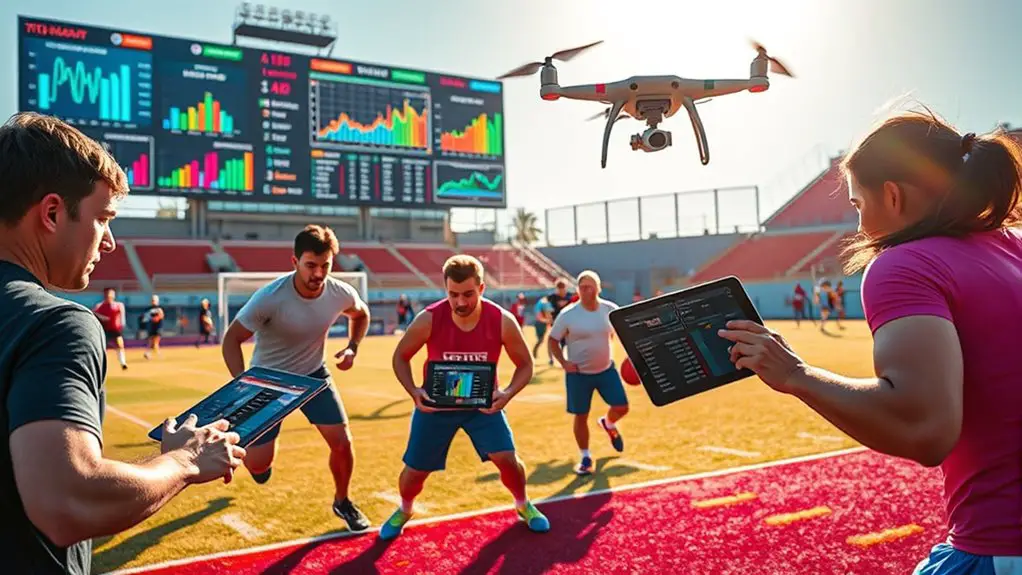The rise of genetic engineering in sports performance is revolutionizing how athletes enhance their abilities. You'll see innovations like CRISPR technology, which allows precise edits to genes impacting strength and endurance. With personalized training regimens based on genetic insights, athletes can optimize their performance and reduce injury risks. However, this raises ethical concerns about fairness and equity. If you're curious about the implications and future trends of these advancements, there's much more to explore.
Understanding Genetic Engineering in Sports
As athletes continuously seek ways to enhance their performance, understanding genetic engineering becomes increasingly significant. Genetic testing can reveal your unique athlete genetics and genetic predisposition, allowing for tailored training optimization. Imagine being equipped with insights that help push beyond your biological limits while minimizing potential health risks.
In the domain of sports medicine, performance analysis driven by genetic data offers a competitive advantage that could redefine your training regimen. Moreover, insights gained from genetic testing can inform your training and nutrition strategies to maximize strengths and address weaknesses. However, the ethical implications of such advancements can't be ignored. Balancing the pursuit of excellence with integrity is vital; you want to guarantee that the pursuit of genetic enhancements doesn't compromise the spirit of sport.
Navigating this frontier means embracing the possibilities while being mindful of the responsibilities that come with them. Ultimately, understanding genetic engineering in sports could empower you to reach new heights while preserving the essence of fair competition.
The Science Behind Gene Editing Techniques
When you think about gene editing in sports, CRISPR technology probably comes to mind first. This groundbreaking tool allows for precise modifications in DNA, opening up new possibilities for enhancing athletic performance. Additionally, gene therapy applications are becoming increasingly relevant, promising to address genetic weaknesses that can hold athletes back.
CRISPR Technology Explained
CRISPR technology has revolutionized the field of genetic engineering, offering an unprecedented way to edit genes with precision and efficiency. You might wonder how this works and its implications for sports performance. Here's a quick overview:
| Aspect | Description | Examples |
|---|---|---|
| CRISPR Applications | Editing genes to enhance traits | Muscle growth, endurance |
| CRISPR Challenges | Ethical concerns and regulations | Potential misuse |
| CRISPR Advancements | New techniques improving accuracy | Base editing |
| CRISPR Safety | Ensuring minimal off-target effects | Rigorous testing |
With CRISPR, athletes could access their full potential, but it's essential to navigate the challenges and prioritize safety. Embracing this freedom could change sports forever.
Gene Therapy Applications
While gene therapy often brings to mind treatments for genetic disorders, its applications in sports performance are equally intriguing. With recent gene therapy advancements, athletes are exploring ways to enhance their physical abilities through genetic modification techniques. Imagine being able to tweak genes to improve endurance, strength, or recovery time. This isn't just a distant dream; it's a reality that some are beginning to embrace. You might think of the ethical implications, but for many athletes, the allure of pushing human limits is irresistible. As these techniques evolve, they could redefine what it means to be a competitor, giving you the freedom to release potential you never knew existed. The future of sports may be a blend of biology and innovation.
Potential Benefits of Genetic Enhancement for Athletes
Imagine if you could enhance your physical abilities through genetic engineering, giving you an edge in competition. Not only could this lead to improved performance, but it might also help you resist injuries, keeping you in the game longer. Let's explore how these advancements could revolutionize sports for athletes like you.
Enhanced Physical Abilities
As athletes seek every advantage to enhance their performance, genetic engineering presents a groundbreaking opportunity to push physical limits. By utilizing molecular performance techniques, you can access your body's full potential. Imagine biohacking athletes like yourself, tapping into genetic modifications that boost strength, speed, and endurance. This isn't just a dream; it's becoming a reality. Enhanced physical abilities could give you the edge needed to outperform competitors in a way that's never been possible before. With careful application of these advancements, you can redefine what's achievable in your sport. The freedom to explore these enhancements could transform not only your training but your entire athletic journey, allowing you to reach heights you once thought unattainable.
Injury Resistance Improvements
How can genetic engineering revolutionize injury prevention for athletes? Imagine a world where you could enhance your body's ability to resist injuries through genetic resilience. By targeting specific genes linked to muscle recovery and joint stability, you could greatly reduce the risk of common sports injuries. This isn't just a dream; it's the potential future of athletic training. With advancements in genetic engineering, you might be able to tailor your genetic makeup to enhance your body's natural defenses, allowing you to push your limits without fear. This freedom to train harder, recover faster, and stay injury-free could redefine what it means to be an athlete. Embracing this technology might just be the key to revealing your full potential.
Ethical Concerns Surrounding Genetic Manipulation
While the potential benefits of genetic manipulation in sports performance are enticing, ethical concerns loom large over the practice. You might wonder about the moral implications of altering an athlete's biology to gain a competitive edge. Is it fair to those who rely solely on training and natural talent? This raises significant questions about social equity. If only the wealthy can afford genetic enhancements, the playing field could become increasingly uneven.
Moreover, consider the athlete's autonomy—should they have the freedom to choose genetic modifications, or does this infringe upon their natural identity? The risk of coercion also exists, where athletes might feel pressured to undergo these procedures to stay relevant. As we navigate this uncharted territory, it is vital to weigh the allure of genetic advancements against the potential erosion of fairness and integrity in sports. Balancing innovation with ethical standards is imperative for a truly equitable athletic environment.
Case Studies: Athletes Utilizing Genetic Technologies
As we explore case studies of athletes using genetic technologies, it's essential to look at the role of CRISPR in athletic training. You'll also notice the ongoing controversies surrounding gene doping and its impact on fair competition. These examples highlight both the potential benefits and ethical dilemmas of genetic engineering in sports.
CRISPR in Athletic Training
Since the advent of CRISPR technology, athletes have begun to explore its potential to enhance training and performance. With CRISPR applications, you can personalize your training adaptation through genetic testing, allowing for optimized performance monitoring. This freedom to tailor workouts based on your unique genetic makeup can lead to significant advancements. However, ethical implications arise, as the line between natural talent and engineered enhancement blurs. Regulatory frameworks are still catching up, leaving a gray area regarding what's acceptable in sports. Athletes must navigate these complexities, balancing the pursuit of excellence with integrity. Embracing CRISPR could revolutionize athletic training, but it's crucial to reflect on the broader ramifications of such powerful technology.
Gene Doping Controversies
Although gene doping remains a contentious issue in sports, several high-profile cases have drawn attention to its potential and pitfalls. Athletes like the infamous Chinese swimmer and a few track stars have faced scrutiny for allegedly using genetic technologies to enhance performance. These instances highlight the ethical implications of gene doping, raising questions about fairness, safety, and integrity in competition. While some argue for the freedom to enhance one's abilities, others believe it undermines the spirit of sportsmanship. As you consider the benefits and risks, it's vital to reflect on what defines true athletic achievement. The debate continues, urging us to balance innovation with the core values that make sports so compelling.
The Role of Personalized Training Regimens
While personalized training regimens have become increasingly popular, their effectiveness is largely amplified through genetic insights. By integrating genetic assessments into your training, you can access a new level of performance. These insights help you understand your unique strengths and weaknesses, paving the way for tailored workouts that truly resonate with your body's capabilities.
Imagine having a training program designed just for you, optimizing every session to maximize your potential. You won't just be following generic routines; you'll be engaging in workouts that align with your genetic profile, enhancing your freedom to excel.
With personalized regimens, you'll notice better recovery, improved endurance, and a more efficient path towards your goals. Additionally, AI-enhanced performance analytics can further refine your training strategy by providing data-driven insights into your performance patterns. You deserve to break free from one-size-fits-all approaches and embrace a training style that reflects who you are. In the pursuit of excellence, genetic insights can empower you to reach new heights in your athletic journey.
Regulatory Challenges in Genetic Engineering in Sports
As personalized training regimens harness genetic insights to boost athletic performance, the intersection of genetics and sports also brings forth a host of regulatory challenges. You might wonder how these advancements fit within existing regulatory frameworks. Anti-doping policies are struggling to keep pace with rapid developments, leading to compliance challenges that could undermine fair competition.
Legal implications arise as athletes navigate the murky waters of genetic enhancements, raising governance issues that demand clear ethical guidelines. The lack of international standards makes it difficult for organizations to implement consistent enforcement mechanisms.
Without a unified approach, athletes risk facing penalties that could derail their careers. The freedom to explore genetic engineering must be balanced with responsible oversight. As you consider these innovations, it is vital to advocate for regulations that guarantee integrity while allowing for personal advancement in sports.
Public Perception and Acceptance of Genetic Enhancements
How do you feel about the idea of genetic enhancements in sports? It's a topic that sparks intense debate, reflecting varied public attitudes. Some see it as a natural evolution of athletic performance, while others worry about fairness and the integrity of competition. You might appreciate the freedom that genetic engineering offers athletes to push their limits, but consider the societal implications too.
Will we create a divide between those who can afford enhancements and those who can't? There's a fear that genetic modifications could lead to a new form of elitism in sports. As the conversation evolves, it's essential to weigh both the potential benefits and the ethical dilemmas. Ultimately, acceptance hinges on finding a balance between innovation and the core values of fairness and equality. How we navigate this complex landscape will shape the future of sports and public perception.
Future Trends in Sports and Genetic Engineering
The conversation around genetic enhancements is likely to shape the future of sports in profound ways. As athletes and trainers explore the potential of genetic engineering, performance optimization will reach new heights. You might envision a world where tailored genetic modifications help athletes excel in their disciplines while maintaining a rich tapestry of genetic diversity. This balance could empower individuals to push their limits without sacrificing their unique traits.
In this evolving landscape, you'll see advancements that not only enhance physical capabilities but also prioritize athletes' well-being. Imagine teams utilizing genetic insights to create personalized training regimens, fostering both individual growth and team synergy. The freedom to choose genetic enhancements could revolutionize how you perceive athleticism, pushing the boundaries of what's possible. As we embrace these changes, it's crucial to contemplate how they enhance the spirit of competition while celebrating the diverse strengths each athlete brings to the field.
The Impact on Fairness and Integrity in Competitive Sports
While genetic engineering holds the promise of enhancing athletic performance, it also raises significant questions about fairness and integrity in competitive sports. You might wonder how these advancements impact the core values of fair play and competitive integrity. As athletes push the limits of human potential, the potential for inequality grows.
- Who gets access to genetic enhancements?
- Will these technologies widen the gap between elite and amateur athletes?
- How can governing bodies enforce regulations effectively?
- What happens to the spirit of competition when genetics plays a role?
- Are we redefining what it means to be an athlete?
These concerns challenge the essence of sports. If some athletes can genetically engineer their abilities while others can't, the integrity of competition could be compromised. Ultimately, maintaining fair play in the face of rapid advancements is vital for the future of sports.
Frequently Asked Questions
How Does Genetic Engineering Affect Injury Recovery Times in Athletes?
Genetic engineering can greatly impact injury recovery times for athletes. By utilizing genetic therapy, you can potentially enhance your body's natural healing processes, allowing for quicker recovery. Tailored recovery protocols can be implemented, optimizing your rehabilitation and reducing downtime. This means you won't just bounce back faster, but you'll also have the chance to regain peak performance levels sooner. The freedom to recover efficiently can redefine how athletes approach their training and competition.
Can Genetic Enhancements Lead to Long-Term Health Risks for Athletes?
You might wonder if genetic enhancements can lead to long-term health risks for athletes. While they offer potential performance benefits, they could also cause unintended genetic mutations, raising ethical concerns about the implications for health. It's essential to contemplate whether the pursuit of excellence is worth the possible dangers. You deserve the freedom to excel, but not at the expense of your long-term well-being. Balancing ambition with caution is key.
What Are the Costs Associated With Genetic Engineering for Sports?
When you're playing with fire, you might get burned. The costs associated with genetic engineering in sports aren't just about financial implications; they also involve ethical considerations that can't be ignored. You've got the hefty price tags of research, treatments, and potential legal fees. Plus, the moral dilemmas surrounding fairness and health risks can create a cloud of controversy that could overshadow any potential benefits athletes might seek.
How Is Genetic Data Privacy Maintained for Athletes Undergoing Enhancement?
When it comes to maintaining athletes' genetic data privacy, you need to take into account data protection laws and ethical considerations. Organizations should implement strict protocols to guarantee that sensitive information isn't misused. You might find it reassuring that athletes often have control over who accesses their data, safeguarding their rights are respected. Transparency and consent are essential, allowing athletes the freedom to choose how their genetic enhancements are shared or kept confidential.
Are There Specific Sports More Impacted by Genetic Engineering Than Others?
Imagine a sprinter with the genetic traits of a cheetah—speed and agility that leave others in the dust. Some sports, like track and field or swimming, are more impacted by genetic engineering, amplifying performance disparities. Athletes with enhanced genetic traits can dominate, creating an uneven playing field. It raises questions about fairness and the essence of competition. You might wonder, where's the freedom to compete when genetics can tilt the scales so dramatically?




